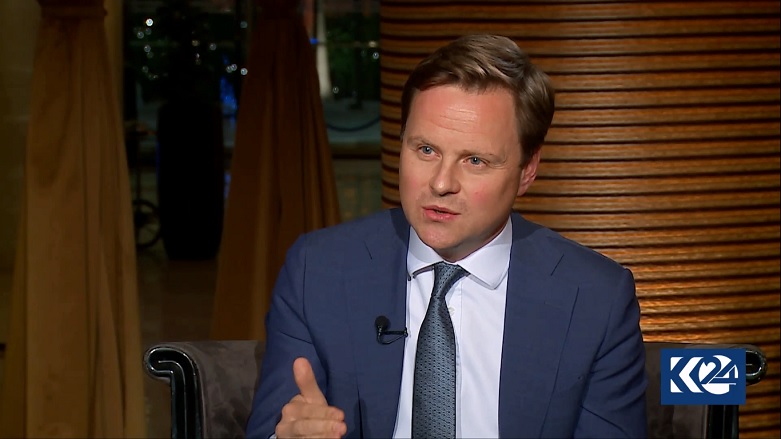UK will work with Erbil and Baghdad to ensure ‘accountability’ after militia attacks: envoy to Iraq

ERBIL (Kurdistan 24) – The British government will work closely with the governments in the Kurdistan Region and Iraq following a spate of militia attacks in the Kurdistan Region, Stephen Hickey, the UK Ambassador to Iraq, said on Thursday.
“We will now work closely with the government in Baghdad and the government in Erbil to make sure that there is accountability for these attacks and that no further attacks occur,” Hickey told Kurdistan 24 following an event at the Erbil-based Middle East Research Institute (MERI).
Last week interior ministries of the Kurdistan Regional Government (KRG) and Iraq issued a rare joint statement reaffirming their cooperation, following an unprecedented drone attack on the US-led coalition base at the Erbil international airport on April 14. Four days later, two people were injured when rockets were fired at the Balad air base in Iraq that hosts US contractors tasked with maintaining Iraq’s F-16 fleet.
No one was killed in either incident, which have been blamed on Iran-backed militias, but they follow deadly rocket attacks including one in Erbil on February 15 that killed a Filipino contractor working for the coalition, as well as two civilians in the city. A British soldier and two Americans were killed in a rocket attack last April at the Taji camp near Baghdad.
Earlier on Thursday Hickey told the MERI audience that the British government’s overall priority in Iraq and the autonomous Kurdistan region was to promote stability and prosperity.
Speaking frankly, Hickey noted that the militia attacks pose a threat not only to the autonomous Kurdistan Region and Iraq but also to “foreigners and investors and diplomats” in the region. The militias, which he stressed have been supported both materially and politically by the government in Iran, also have the support of “so many political actors” in Iraq, particularly in Baghdad, he said.
Iraq has become “essentially the battleground" for the settling of scores between Iran, the US “and other countries as well,” the envoy said, adding that “Iraqis have paid the price.”
“Condemnation is not enough,” Hickey said of the joint statement released by Kurdistan's Western allies after the latest Erbil assault, which the UK signed on to, adding “there’s no quick fix. There’s no easy solution to these militia groups.”
As long as the militias can operate outside the law there won’t be security in either the Kurdistan Region or Iraq, he said.
He noted there was a “difference” in the strength of state institutions between Erbil and Baghdad, but said the UK believes it is vital for the international community to focus not only military, judiciary, ministerial, and counter-terrorism capabilities that have been severely weakened since 2003, but also to support civil society, and address the long-term socioeconomic causes of conflict that led to the rise of terrorist groups such as the Islamic State.
